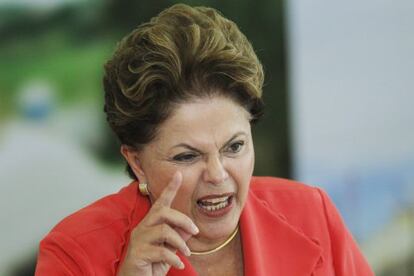Brazilian military generals warn Rousseff in an open manifesto
Strains between president and top brass intensify after document is published Former minister Valdésio Guilheme de Figuereido one of three generals who signed the statement


Strains between Brazilian President Dilma Rousseff and her country's top military brass have intensified in recent days over the publication of a manifesto in which army generals openly criticize her leftist government.
The officials took umbrage over comments made by two of Rousseff's ministers - María do Rosario, who is in charge of human rights, and Eleonora Menicucci, who is head of the Women's Ministry - criticizing the military as they came out in support of revisions to the country's amnesty laws.
In their manifesto, entitled Warning to the nation, let them come because they won't pass through, the army chastised Rousseff for not scolding her ministers. The officers also said that they do not recognize Defense Minister Celso Amorim's jurisdiction over them.
Under pressure from the government, the heads of military clubs were obliged to denounce the statement and were eventually forced to pull it from their websites.
On Amorim's advice, the president decided to punish the 98 officers who signed the statement. But that only served to infuriate the army, and more officers - around 235 - came forward to sign the declaration. One of the three generals who signed the statement was Valdésio Guilheme de Figuereido, a former minister and influential member of the military tribunal.
In a related issue, the head of the army reserve, Luiz Eduardo da Rocha Paiva, questioned in an interview with a well-respected journalist whether Rousseff was actually tortured, as she claims she was, during the military dictatorship.
While serving as a member of a leftwing guerrilla group during the 1970s, Rousseff was captured and held for months before being released. Rocha Paiva challenged Rousseff to appear before her own Truth Commission, which is being organized by Congress, to investigate crimes committed during the dictatorship.
"Why don't they call in President Dilma?" Rocha Paiva asked. "She belonged to the VAL-Palmares group, which was responsible for throwing the [1968] bomb that killed soldier Mario Kozel Filho. She was part of the group's support team."
Nevertheless, Rocha Paiva said he didn't believe the upcoming Truth Commission would be impartial in its findings because it will only be charged with investigating crimes committed by the dictatorship and not by any leftist groups.
"If the Truth Commission's objective is to clear up issues regarding torture, deaths, missing people and hidden bodies, why won't it be given the task of looking at the terrorist attacks, kidnappings, hijackings of planes and executions carried out by the armed groups?" he asked.
The general's statements over Rousseff are seen as confrontational because, besides the account given by the president herself, there is strong evidence - including statements from those who were also in the prison where the president was held - that she was tortured for 21 straight days.
Tu suscripción se está usando en otro dispositivo
¿Quieres añadir otro usuario a tu suscripción?
Si continúas leyendo en este dispositivo, no se podrá leer en el otro.
FlechaTu suscripción se está usando en otro dispositivo y solo puedes acceder a EL PAÍS desde un dispositivo a la vez.
Si quieres compartir tu cuenta, cambia tu suscripción a la modalidad Premium, así podrás añadir otro usuario. Cada uno accederá con su propia cuenta de email, lo que os permitirá personalizar vuestra experiencia en EL PAÍS.
¿Tienes una suscripción de empresa? Accede aquí para contratar más cuentas.
En el caso de no saber quién está usando tu cuenta, te recomendamos cambiar tu contraseña aquí.
Si decides continuar compartiendo tu cuenta, este mensaje se mostrará en tu dispositivo y en el de la otra persona que está usando tu cuenta de forma indefinida, afectando a tu experiencia de lectura. Puedes consultar aquí los términos y condiciones de la suscripción digital.








































